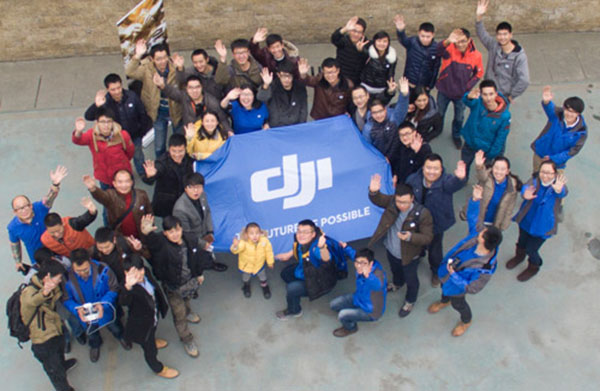

 |
It seems that DJI has achieved overnight success. Rising to fame and claiming public attention in 2014, DJI has been researching, developing and manufacturing small civilian UAV for more than a year; according to The Economist, the company is at the forefront of the civilian-drone industry.
DJI has taken about 70% of the global market in small civilian UAV, distributed mainly in Europe and America. The company's staff has grown from 300 to 3500 (including 1000 research personnel) over the past two years.
Now DJI is attracting media attention and industry awards. What are the reasons behind its success.
A company focusing on the products
After three years of confidential research and development without publicity, DJI has rolled out new products every year since 2009. In 2012 in particular, it rolled out the first aerial photography AIO machine in the world - the DJI Phantom. This model extended the market beyond the professional model enthusiast and into the mass consumer demographic. All of a sudden, flying a model aircraft had become flying a model aircraft and taking aerial photographs.
“If you analyze the reasons for DJI's success, the most important factor is the principle of focusing on all the products all the time,” says vice president Shao Jianhuo. ”DJI uses its product innovation to win customers at home and abroad.”
A founder who pursues perfection
"Frank's relentless pursuit of innovation is what lies behind the company's obsession with continuous innovation," says Shao Jianhuo. Shao has known Wang for a long time. Frank participated in ABU Robocon twice while studying in Hong Kong; he and his teammates won first prize in the Hong Kong area, and third prize in the Asia-Pacific region in the second round. "He learned about and understood competition and cooperation from the two games, which laid the foundation for his mature approach to business,” continues Shao.
In 2006, Frank went back to Hong Kong University of Science and Technology to complete his master's degree; meanwhile, he set up DJI as an official company along with two classmates who were focusing on the same research topic. The company only had five workers at first, and was located in a residential building in Shenzhen no bigger than 80 square meters. ”The company had a tough time at first due to lack of quality staff,” says Shao Jianhuo. "Even if we found the right person, we couln't hold onto them." It is hardly surprising that employees who had the ability to join a global top 500 company were unimpressed with one whose premises looked like a workshop ”.
Despite all this, the company quickly made money – independdent hover techonology was in its infancy at the time. ”One item sold for 20,000 Yuan,” says Frank. "But this wasn't the deveopment direction we wanted to take." In his view, high price meant limited market share. But he hoped that more customers would equal better quality products”.
DJI started to apply its new business model. Profits soared and prices fell. Frank Wang proposed the awkward-sounding ”DJI Spirits” at the company's annual meeting at the beginning of 2015, these being ”upward with all effort, pursuit of truth, and high quality products”. The principle is that DJI personnel will continue to pursue excellence and achieve the company's goals with great passion, without interference, and without being distracted by considerations of short-term image, doing business with good faith and practical ideas.
An environment that encourages innovation
DJI has to establish a good working environment to attract outstanding talent; new recruits must love DJI from the moment they arrive.
In addition to its enviable income and social benefits, DJI also provides a relaxed internal business environment for its employees. The reason why Yu Siyue, a student from the Department of Chinese of Wuhan University, likes working for DJI is that the company pursues pure ideas in a human way. "There is no superior/subordinate relationship here; we are all young people with vitality and vigour. Every idea is given a hearing, and we can discover our values here,” says Yu. "The poetry and art of a technological company drive its innovation.” Surprisingly, vice president Shao Jianhuo majored in fine arts.
“The most precious gift is the unfettered imagination of young people.” From the National RoboMasters competition launched by DJI, Shao Jianhuo hopes that some contestants will go on to become the backup innovation force of DJI.
 |
 J-11 fighters in air exercise
J-11 fighters in air exercise Beauties dancing on the rings
Beauties dancing on the rings Attendants-to-be join Mr. & Miss Campus Contest
Attendants-to-be join Mr. & Miss Campus Contest Beijing's toughest anti-smoking law takes effect
Beijing's toughest anti-smoking law takes effect Family lives in cave for about 50 years in SW China
Family lives in cave for about 50 years in SW China PLA soldiers operating vehicle-mounted guns in drill
PLA soldiers operating vehicle-mounted guns in drill Blind carpenter in E China's Jiangxi
Blind carpenter in E China's Jiangxi China hosts overseas disaster relief exercise for the first time
China hosts overseas disaster relief exercise for the first time 20 pairs of twins who will become flight attendants in Sichuan
20 pairs of twins who will become flight attendants in Sichuan Obama is sowing discontent in S.China Sea
Obama is sowing discontent in S.China Sea Rescuers work through night to reach cruise ship survivors
Rescuers work through night to reach cruise ship survivors Driving through limbo
Driving through limbo Facing down MERS
Facing down MERSDay|Week